
Economist, March 29
(posted Saturday, March 29)
A 20-page survey hails Silicon Valley as the model for 21st century capitalism. Its high-tech companies display admirable flexibility, reward merit, welcome new ideas, and abhor government regulation. Interesting detail: Silicon Valley's GDP is $65 billion, equal to that of Chile. The cover story compares various international education test scores and concludes that teaching methods--not funding, class size, or culture--determine student performance. The story also favors national and international education standards: They give countries targets to shoot for. An editorial and article advise Netanyahu and Peres to form a coalition government. Only a unified Israel can make real peace with the Palestinians.
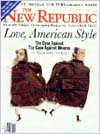
NewRepublic, April 14
(posted Saturday, March 29)
The cover, given over to a long review of two books about divorce, deplores the growing popularity of the anti-divorce movement. Among the review's claims: Divorce harms kids less than "divorcephobes" claim; divorce rates rose in the '60s because of women's economic independence, not because of selfish '60s values; and the United States, where marriage has always been for love, is naturally more divorce-prone than Europe and Asia are. (See also Slate's "Dialogue" on divorce.) An article ridicules the Recovery Channel ridicules the Recovery Channel, a start-up cable venture that will feature drug addicts, alcoholics, and overeaters 24 hours a day. It is "the logical terminus for a culture in love with its own dysfunction." Also, a story criticizes Bush counsel C. Boyden Gray. Gray, who has berated Clinton's fund-raising techniques, is himself a massive soft-money donor and a lobbyist who exploits his insider ties.

New York Times Magazine, March 30
(posted Thursday, March 27)
Free-speech attorney Floyd Abrams denounces the Clinton administration's indifference to the First Amendment. Clinton has pushed the Communications Decency Act and the V-chip because he cares more about being "family friendly" than about protecting free speech. (For Slate's take, see "Clinton Turns Yellow.") The cover story chronicles the making of a documentary film about teen-age domestic violence: It takes the filmmakers to task for exploiting their naive, vulnerable subjects. Also, an article about the collapse of the go-go Japanese art purchases of the '80s: Many buyers have gone bankrupt, and their paintings have vanished into Japanese bank vaults.
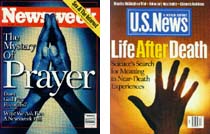
Newsweek and U.S. News & World Report, March 31
(posted Tuesday, March 25)
The Easter spirit is contagious: A week after Time's heaven cover story, Newsweek and U.S. News counter with their own religious covers. Newsweek's "The Mystery of Prayer" reports that 87 percent of Americans believe God answers their entreaties. Theologians agree that prayer reinforces faith even when God doesn't intercede. U.S. News offers a credulous cover story on near-death experiences (NDEs). A third of people who almost die report experiencing a spiritual vision. Skeptical doctors assert that such NDEs are purely physiological (naval pilots exposed to extreme gravity also have visions of bright lights and a God figure). A sidebar argues that black holes and quarks are evidence of God's "grand design" for the universe.
Also in Newsweek, a column on the Helsinki summit concludes that it was successful but barely newsworthy, since Russia is so weak.
Also in U.S. News, the defense strategy in the Oklahoma City trial: McVeigh's lawyer will raise questions about crime-lab incompetence, coerced government witnesses, and the mysterious John Doe No. 2.
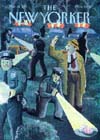
The New Yorker, March 31
(posted Tuesday, March 25)
The New Yorker wonders if U.S. News' new editor, James Fallows, can rescue the magazine from its current irrelevance. The answer: probably not. Fallows is depicted as too righteous for his own good, lacking the "stop-the-presses adrenaline" needed for a successful newsmagazine. A long profile of Ted Kennedy credits him with Clinton's 1996 victory: Kennedy persuaded Clinton to emphasize liberal causes (Medicare, minimum wage) that reassured his Democratic base. The article finds Kennedy revitalized. And The New Yorker argues that Hollywood is struggling because it makes too many super-expensive movies.
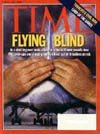
Time, March 31
(posted Tuesday, March 25)
Airline safety is on the cover. Time excerpts a new book by Mary Schiavo, the former inspector general of the Department of Transportation who had warned that ValuJet was unsafe before last year's crash. Schiavo tells horror stories: FAA safety inspections are perfunctory, counterfeit parts are epidemic, air-traffic-control computers are outdated, and airport security is lax. She advises passengers to avoid old planes and start-up airlines, and to sit near emergency exits. The week's fund-raising scandal angle: To avoid oversight, the Democratic National Committee instructed donors to funnel contributions through state parties. Also, kids and AIDS: Doctors don't know what medicines (and dosages) to prescribe.
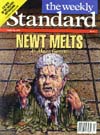
WeeklyStandard, March 31
(posted Tuesday, March 25)
Echoing a recent New Republic cover story, "Newt Melts" argues that Gingrich is on his way out. His recent retreat from a tax cut and his embrace of Jesse Jackson infuriate conservatives: A back-bench challenge might be imminent. Republican Rep. Peter King writes a sidebar slamming Gingrich as the "most powerful liberal in American politics" for his opposition to tax cuts and his support of the National Endowment for the Arts. Also, the Standard editorializes against needle exchange, saying there isn't sufficient evidence that it stops AIDS transmission. "Government should not make itself a technician of cocaine and heroin addiction."

TheNation, April 7
(posted Tuesday, March 25)
The Nation chronicles "A Year in Corporate Crime." The list includes ADM's price fixing, a billion-dollar rip-off by Prudential, defense-contractor fraud, stock fraud, and discrimination (Mitsubishi, Texaco). The point: Corporations are not good citizens. An article denounces the conservative claim that death-penalty defendants are adequately represented. Most vivid detail: The attorney for one Texas murder defendant slept through most of the trial. Also, the actor (and Nation stockholder) Paul Newman writes an editorial mocking Jesse Helms.
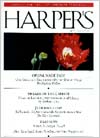
Harper's, April 1997
(posted Thursday, March 20)
An immensely long article condemns the Drug Enforcement Administration's war on poppy growers. Though poppies have legitimate commercial use (poppy-seed bagels, for instance), the feds are paranoid that gardeners will harvest them for opium. The author grows his own opium poppies, and wonders if he's going to be prosecuted. Also, a creepy explanation for the Rwanda genocide: "Judgment Day" asserts that Rwandans are incredibly law-abiding, so when the government ordered them to kill Tutsis, they obeyed without a second thought. The writer visits Rwanda's awful prisons, where 92,000 people await trial.
--Compiled by David Plotz and the editors of Slate.
